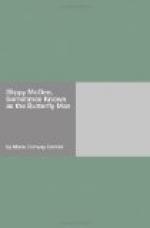“Let us hope, then, for Laurence’s peace of mind,” said my mother, “that he’ll get over it—like all the rest of his sex. Though I shouldn’t call Laurence fickle, or faithless, if you ask me.”
“He is a very fine boy. I always liked him myself and James adores him. If I had two or three daughters, I’d be willing to let one of them marry Laurence—after awhile. But having only one I must say I want her to do better.”
“I see,” said my mother. To me she said later:
“And yet, Armand, although I condemn it, I can quite appreciate Mrs. Eustis’s point of view. I was somewhat like that myself, once upon a time.”
“You? Never!”
My mother smiled tolerantly.
“Ah, but you never offered me a daughter-in-law I did not relish. It was much easier for me to bear the Church!”
That night I went over to John Flint’s, for I thought that the fact of Mary Virginia’s deliberately choosing to act as she had done would in a measure settle the matter and relieve his anxiety.
There was a cedar wood fire before which Kerry lay stretched; little white Pitache, grown a bit stiff of late, occupied a chair he had taken over for his own use and from which he refused to be dislodged. Major Cartwright had just left, and the room still smelt of his cigar, mingling pleasantly with the clean smell of the burning cedar.
On the table, within reach of his hand, was ranged the Butterfly Man’s entire secular library: Andrew Lang’s translation of Homer; Omar; Richard Burton’s Kasidah; Saadi’s Gulistan, over which he chuckled; Robert Burns; Don Quixote; Joan of Arc, and Huckleberry Finn; Treasure Island; the Bible Miss Sally Ruth had given him—I never could induce him to change it for my own Douai version—; one or two volumes of Shakespeare; the black Obituary Book, grown loathsomely fat; and the “Purely Original Verse of James Gordon Coogler,” which a light-minded professor of mathematics at the University of South Carolina had given him, and in which he evilly delighted. Other books came and went, but these remained. To-night it was the Bible which lay open, at the Book of Psalms.
“Look at this.” He laid his finger on a verse of the nineteenth: “The testimony of the Lord is sure, making wise the simple.”
“The times I’ve turned that over in my mind, out in the woods by night and the fields by day!” said the Butterfly Man, musingly. “The simple is me, parson, and the testimony is green things growing, and butterflies and moths, and Kerry, and people, and trouble, and Louisa’s hair, and—well, about everything, I reckon.
“Yes, everything’s testimony, and it can make wise the simple—if he’s not too simple. I reckon, parson, the simple is lumped in three lots—the fool for a little while, the fool for half the day, and the life-everlasting twenty-four-hours-a-day, dyed-in-the-wool damn-fool.




